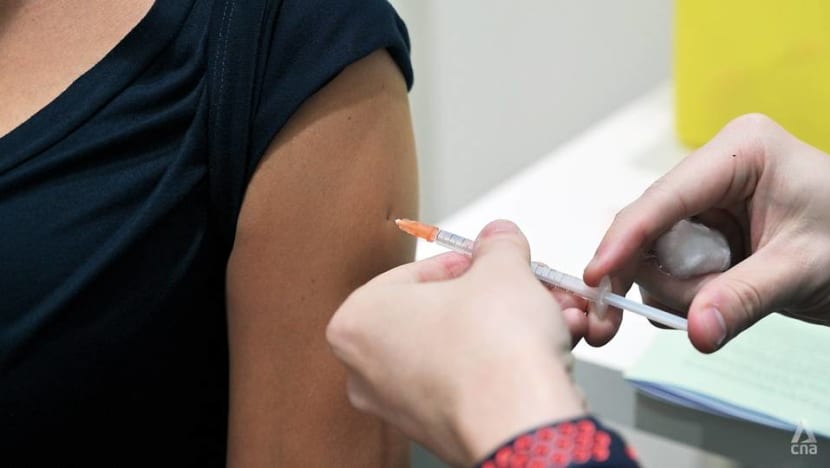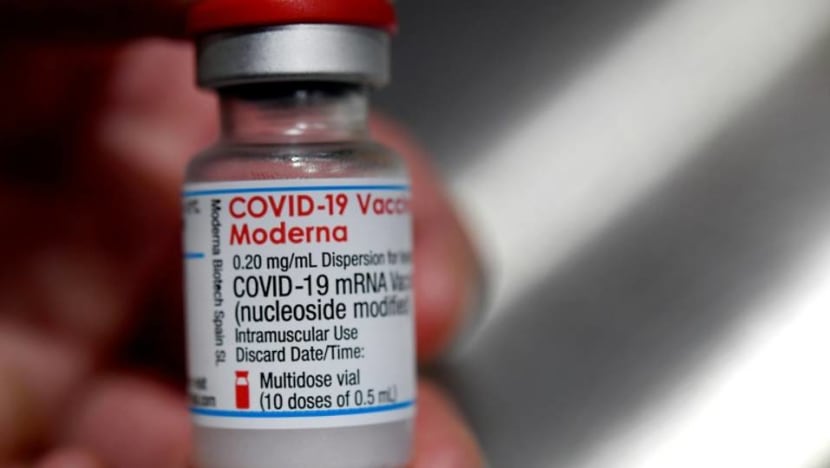Commentary: Booster shots have side effects. Workplaces can afford to be more understanding
By now millions of jabs have gone into arms of the old, young and many more in between. CNA's Crispina Robert says managing the usual side effects with responsibilities at work or home can be challenging.

The COVID-19 vaccine being administered at Kolam Ayer Community Club, Singapore on Apr 21, 2021. (File photo: CNA/Marcus Mark Ramos)
SINGAPORE: When the COVID-19 vaccine became available in Singapore and slots for my age group opened up earlier this year, I registered online right away.
It felt good to do my part against this new scary virus. I scheduled my first dose on a Sunday evening and woke up the next morning feeling only a slightly sore arm.
A few weeks later, I went in for my second dose – on a same Sunday evening slot. Except this time, things were vastly different.
I woke at 3am, with a high fever and chills. I stumbled out of bed, popped some paracetamol yet couldn’t sleep. My arm felt like a tonne of bricks.
A few hours later that Monday morning, I groggily woke up to the alarm going off. Things continued downhill.
While I was working from home, I had a full day of tasks ahead of me. But as soon as I sat down at my desk and logged on, I knew I had to take a sick day. Thankfully, I had a team who could fill in for me. I was back at work the next day after the worst effects wore off although remnants of my brain fog persisted.
A few weeks ago, it was time for a booster shot. I’ll be honest and say this time, I was very hesitant.
Knowing how the second dose messed up several of my days, I decided to plan this third shot carefully. So, I picked an early Saturday morning slot – with the weekend to deal with side effects.
True enough, a fever appeared a few hours in. Except this time, I had cleared my calendar and was ready for it. Thankfully, the effects were much milder (also because the third Moderna dose is much lower than the first two). By Monday, I was perfectly fine.
But when I initially told my family and friends my booster plan, they said I was “wasting” a perfectly precious weekend. I should have gotten the shot on a weekday and taken sick leave instead of doing it during my personal time.
DIFFERENTIATED VACCINATION POLICIES
Some organisations are generous when it comes to treating workers with side effects from vaccinations. OCBC Bank, for instance, gives staff a day off. They also throw in private taxi reimbursement to and from the vaccination centre.
And if someone feels sick, they can take two more days of medical leave without having to show a medical certificate.
Earlier this year, when people worked from the office, Singtel allowed staff to work from home for a week after their shots, so they have time recover if unwell.
And then there are many others who leave it to managers to sort out how to deal with workers who get side effects, with presumably a common-sense approach – if you are not well, get off work and get rest, no need to go to formal lengths to show proof.
Perhaps it comes down to the fact that COVID-19 vaccinations have wildly different effects in people. The Health Sciences Authority (HSA) and the Ministry of Health (MOH) have clear indications on their websites on the kinds of reactions that range from normal to adverse (of which the latter so far account for 0.13 per cent of millions of doses administered).
Most of us get expected side effects. According to data from the United States Centers for Disease Control and Prevention, second shots of an mRNA COVID-19 vaccine saw 53 per cent reporting fatigue, 46 per cent experiencing headaches and 31 per cent had chills.
I had three Moderna shots and those who took the Moderna vaccine reported more of these reactions too.
Are booster shots really necessary? Two infectious diseases specialists break it down on CNA's Heart of the Matter podcast
For adults, long unaccustomed to being vaccinated, “normal” side effects can seem like a hurricane, especially for those of us who hardly fall ill. I for one, cannot remember the last time I had this dreadful combination of fever, chills, fatigue and headache.
And yet others, like my 83-year-old neighbour, felt absolutely nothing. He was out walking, fit as fiddle with nary a sign he’s had anything more than a regular visit to the supermarket on all three of his shots (he took the Pfizer vaccine).
Depending on what you do for a living, a day or two out of action can be a minor inconvenience for the team or an operational issue which requires someone else to cover and a shuffling around of a complicated roster.
I imagine teachers, doctors, nurses and other frontline staff will be hard pressed to take time off especially when someone else has to cover a night or early morning shift.
FEELING GUILTY?
When I felt poorly, I remember feeling guilty that the team had to pick up my share of the work. Some power through the workday popping Panadols until it’s time to call it a day.
I have friends whose supervisors showed annoyance they couldn’t come into work because they were feeling a little tired and sore after a shot, expecting lost hours to be made up for on another day. Others insisted on staff taking their medical leave – requiring the added trouble of going to see the doctor.
Adrian Tan, a HR strategist says trust and a culture of generosity goes a long way. Most companies don’t ask for proof, and it’s taken at face value.
But the bigger point he makes is this: Splitting hairs helps no one. “It’s easy and almost instinctive to bean count but it cuts both ways,’’ he tells me.
For years, employees have done overtime or worked on weekends without complaint. So now, when it’s time for employers to show up for them, demonstrating some good faith will make a difference in ensuring they don’t leave, he says.
And if staff want to schedule their shots on a workday, they should be given time off – advance manpower planning can help.

Mayank Parekh, CEO of the Institute of Human Resource Professionals (IHRP) agrees. He says it's the little things that make the difference in building relationships between supervisors and workers.
As it is, come January next year, more people will be expected to head back into the office. Will the gains from COVID-19 in ditching workplace presenteeism and encouraging people to stay home when they’re sick be undone? Will that evolving compact between companies and workers to focus on outcomes rather than timesheets go out the window?
On a practical level, as long as there are unvaccinated children or vulnerable elderly in homes, workers may want to reduce the risk of transmission and avoid going into the office. In IHRP, Mayank says, only 30 per cent of the staff see a need to return to the office regularly next year.
“Companies shouldn’t underestimate the task of bringing employees back. So, things like leave or time set aside for booster shots can help,’’ he says. Flexibility and understanding can incentivise staff to take their booster shots, making the workplace a lot safer to come back to.
At a time when much has been asked of all of us – from not meeting our families and friends in bigger groups, to dealing with working from home and the mental toll this takes, exercising a large dose of generosity when it comes to vaccination side effects will not only protect us better from a nasty little virus but also make work and the people we work with a lot more pleasant.
We could all use a little more of that in this most unpleasant COVID-19 world.
Crispina Robert is an editor at CNA Digital where she oversees podcasts.


















